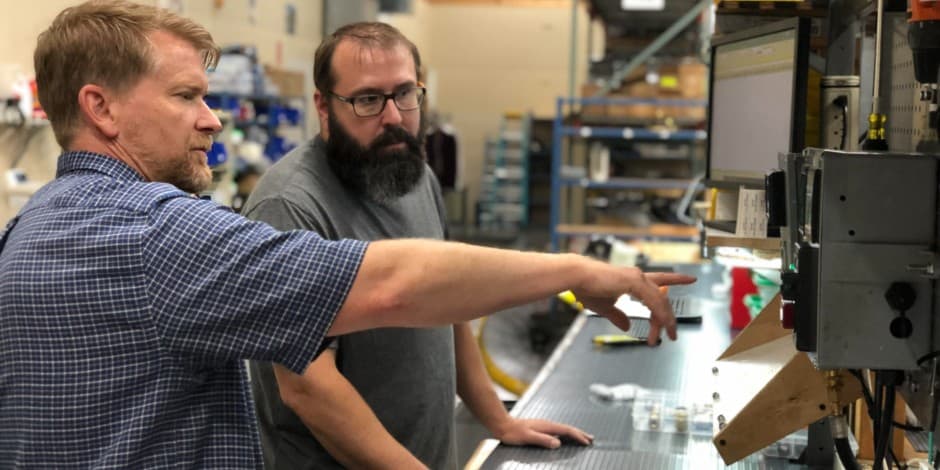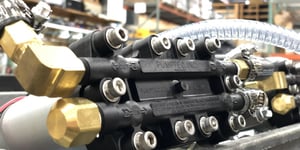Commercial Plunger Pump Troubleshooting: 3 Most Common Issues

Shawn Glover, VP of Sales, Oct 4, 2022

High-pressure plunger pumps are used in numerous industries, from power washing and commercial cleaning to misting, disinfection, pest control, car washes, and more. When operations are disrupted due to problems with the system, it can mean lost time and revenue.
Plunger pump troubleshooting can sometimes feel like a guessing game. However, loss of pressure, weak flow, leaks, excessive noise, and overall poor performance can typically be boiled down to three general causes.
GET THE GUIDE: Commercial Pump Maintenance Checklist
1. Pump Plumbing
Numerous performance issues can occur when a system’s components are improperly installed or configured. The placement of hoses and reservoirs and the overuse of elbows in plumbing can restrict flow, potentially making a pump inoperable. Symptoms of plumbing issues might include excessive pump noise, pulsation, or vibration which can lead to pump cavitation, resulting in permanent damage and pump failure.
- Check the inlet hose for proper rigidity. If it’s too rigid, air bubbles can get sucked into the pump; too malleable and the hose can collapse and restrict flow
- For outlet hoses under high pressure, consider using pulse hoses which help to absorb and dissipate pulsation
- Mount tank reservoir as high as possible to aid self-priming functions and also leverage gravity’s power to help feed the pump system
- Connect the supply above the bottom of the tank reservoir to avoid picking up any settled debris
- Connect the supply line on the opposite side of the tank from where the bypass return is located
- Minimize the excessive use of 90° elbows in plumbing
- Use only the manufacturer’s recommended components (fittings, seals, hoses, etc.) — commodity parts are more likely to fail or fit poorly
- Ideally, invest in a custom pump assembly from the manufacturer to avoid plumbing configuration issues
LEARN MORE: Cost Comparison of Pump Assembly vs. Standalone Pump
2. Improper Maintenance
All commercial pumps will come with a recommended maintenance schedule. Failure to properly maintain a plunger pump will inevitably result in problems down the road and a shorter lifespan for the pump.
- Routinely check for worn, dried, or cracked seals which can result in leaks and cause noise
- Look for plugged or worn check valves which result in reduced and uneven flow, causing noticeable pulsation
- When not in use for long periods of time, drain the reservoir and blow out plumbing lines and hoses. Be sure to winterize your pressure washer in the fall
- Clean filters and nozzles regularly to remove debris and deposits
- Replace worn nozzles, one of the most common causes of low performance — choose the right-sized nozzles made of hard materials that are less likely to erode from high-pressure spray
- Without proper maintenance, cam bearings that are attached to the end of the motor can wear out — follow the manufacturer’s recommended service schedule
LEARN MORE: What You Need to Know About Pump Noise Problems
3. Improper Operation
Sometimes an issue with a high-pressure pump has nothing to do with the pump itself, but because it isn’t being used for its intended purpose or the operator fails to consider the following best practices.
- Ensure that batteries are fully charged and check voltage which should be at least 12 volts — 13.2 volts is considered fully charged
- Check hoses and connections to ensure there are no loose components
- Ensure proper chemical compatibility — work with a pump manufacturer to identify compatible pump materials with the chemicals or cleaning agents being used
- Use liquid temperatures that are less than 140°F or risk damaging the pump
- Never starve a pump or run a pump dry
- Don’t overwork the motor and draw too many amps, which can cause it to burn out
LEARN MORE: Pump Maintenance Tips for Long-Term Storage
There are times when following all of these pump troubleshooting tips will still fail to resolve an issue. That’s because one of the biggest reasons pump problems occur in the first place is simple: the wrong pump is being used for the job.
Request a quote for a custom pump solution from Pumptec to learn how the right pump can eliminate costly repairs and maintenance and deliver lower cost of ownership over the long run. Meanwhile, remember to download our Commercial Pump Maintenance Checklist below.




